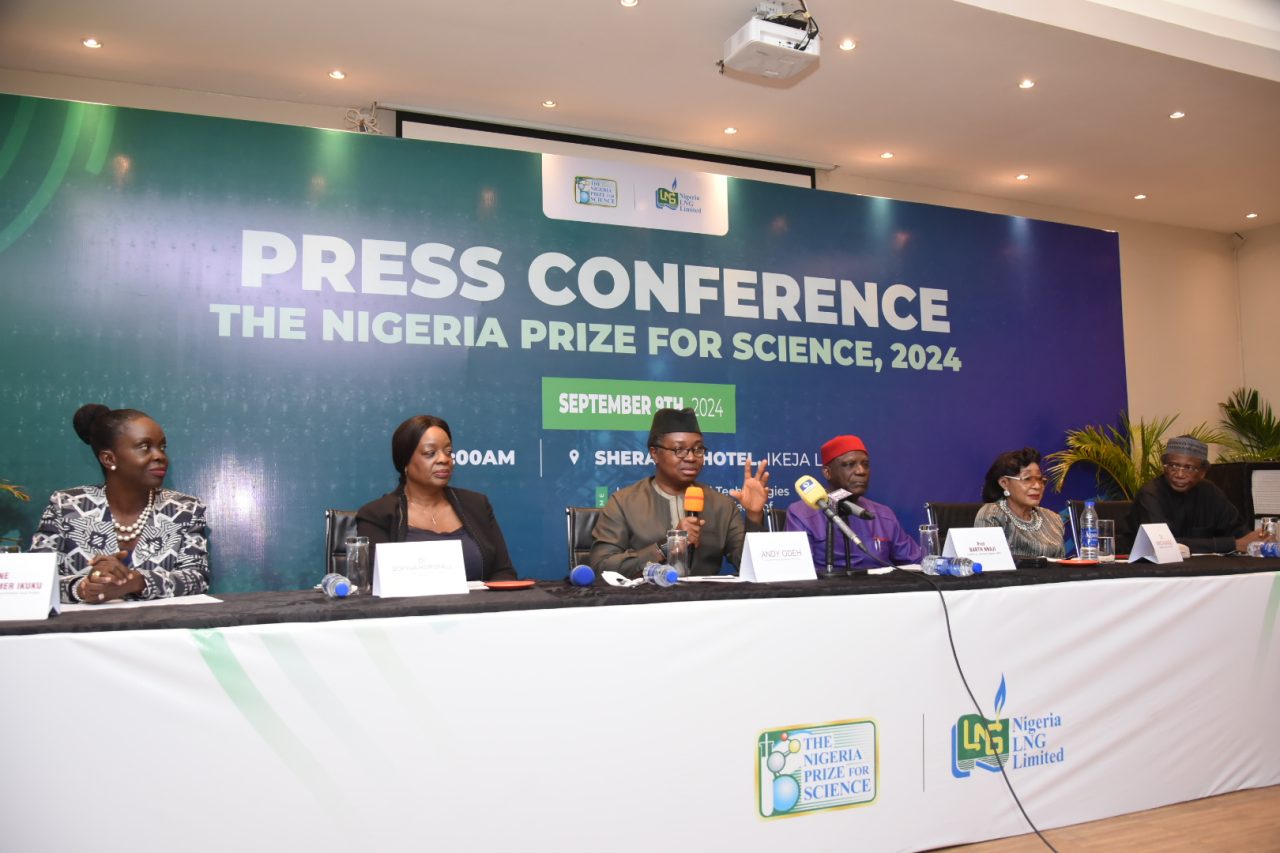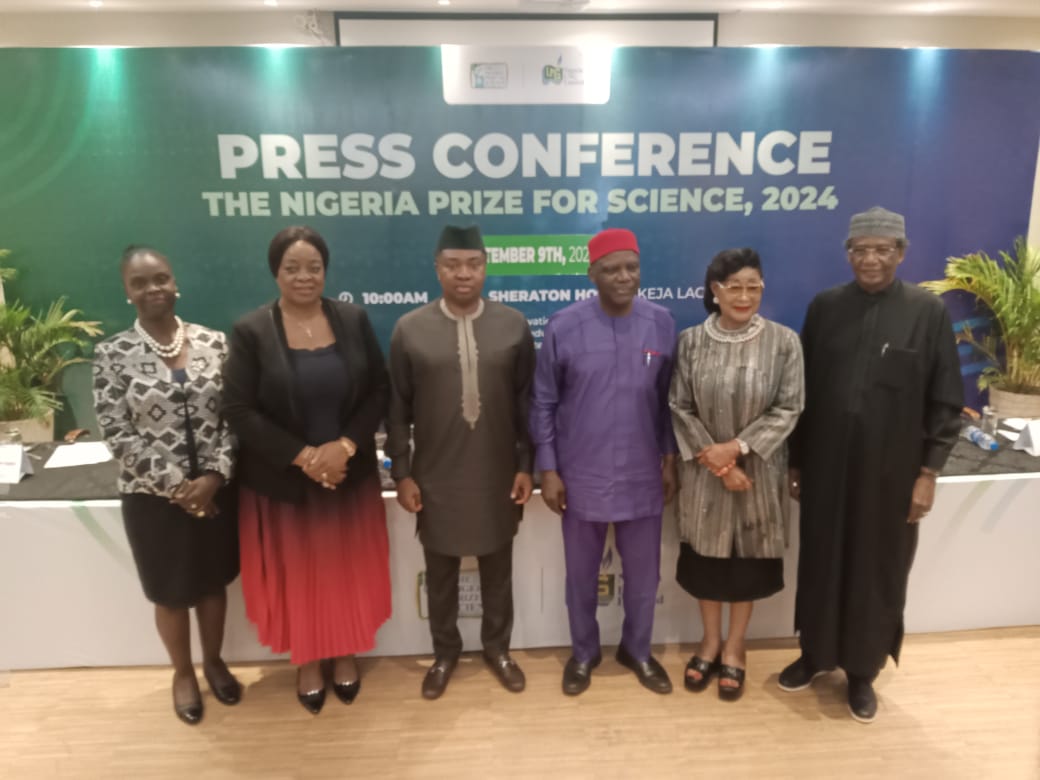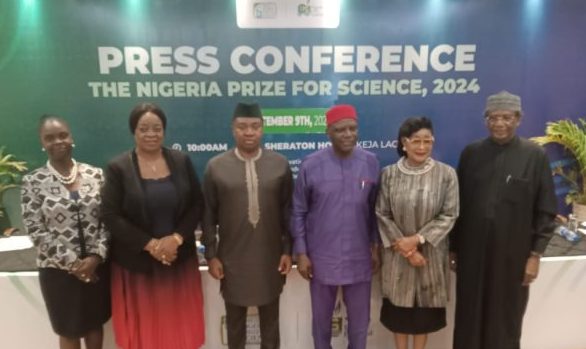The Advisory Board of The Nigeria Prize for Science has officially announced Eni Oko, Olajide Otitoju, and Meihong Wang as the winners of the 2024 edition of the Prize.
The Eagle Online reports that the trio were recognised for their pioneering work on “Process Intensification Technology for Greenhouse Emission Control in Power Generation and Industry for Sustainable Fuel Production (PIC-FUEL).”
The innovation, according to the Advisory Board who made the announcement at a press conference held on Monday, is a significant initiative that could reshape Nigeria’s energy future.
The Board also highlighted that the 2024 competition theme, “Innovations and Technologies for Reducing the Effect of Climate Change”, underscored the need for urgent solutions to environmental challenges.

It was gathered that no fewer than 153 entries were received for the 2024 edition of the prize and shared electronically to the panel of judges.
Also Read:
- Governor Oyebanji seeks stronger military cooperation to combat crime in Ekiti
- Governor Okpebholo inaugurates AAU Governing Council
- Lagos airport supervisor convicted over N11m missing fund
- Cross River suffering from serious deficits — Gov. Otu
- About Seyi Tinubu’s effective altruism, by Funsho Arogundade
Consequently, 51 entries were found to be valid and progressed for adjudication.
The criteria for screening, as approved by the Advisory Board, included: Academic track record, quality, recognitions (Uniqueness, Innovation, Impact), commercialization, soundness, and patent.
A panel of judges was constituted for the evaluation and they were made up of three distinguished Professors in relevant areas of science: Prof. Francisca Nneka Okeke (Chairman), Prof. Saminu Abdulrahman Ibrahim, and Prof. Grace Oloukoi.
From the longlist, entries that met the criteria for shortlist were considered by the three judges and average scores were determined from the individual scores of the three judges which were submitted electronically to the NPS secretariat.



After the evaluation, these three entries were shortlisted based on mean scores of the three judges:
1. Process Intensification technology for greenhouse gas emission Control in power generation and industry for sustainable FUEL production (PIC-FUEL) by Eni Oko, Olajide Otitoju and Meihong Wang
2. Design and development of a bio-digester for production of biogas from dual waste by Otanocha Omonigho and Sunny E. Iyuke
3. Utilization of solid residue from hydrothermal liquefaction of breadfruit pulp for the production of bio-briquette using cassava starch as binder by Chinedum Mgbemena
The winners: Eni Oko is a Senior Lecturer (Associate Professor) in Chemical Engineering at Newcastle University, U.K., while Olajide Otitoju is a Research Associate at the University of Sheffield, U.K. Meihong Wang, is a Professor of Process and Energy Systems Engineering, specialising in Carbon Capture, Utilization, and Storage (CCUS) at the University of Sheffield, UK.
The Eagle Online learnt that Professor Wang is winning the Prize for the second time after his 2019 win with Dr. Mathew Aneke with their work on Carbon Capture, Carbon Utilization, Biomass Gasification and Energy Storage for Power Generation.
In his address, the Chairman of the Advisory Board, Professor Barth Nnaji, posited that the innovation could significantly reduce harmful emissions from power plants and factories while creating cleaner, greener fuels.
Explaining the significance of the groundbreaking work by the three scientists, Prof. Nnaji stated that the PIC-FUEL technology worked by capturing CO2 emissions directly from industrial sources such as power plants, cement factories, and refineries.
He said the emissions are passed through a unit called the Rotating Packed Bed (RPB), where CO2 is absorbed using a solvent and the absorbed CO2 is then converted into methanol through a reaction with hydrogen in an electrolyser machine.
The methanol can then be directly blended with diesel or sold as a product.
“Imagine if every time a factory or power plant released CO2, instead of harmful gases escaping into the atmosphere, those gases were captured, transformed, and repurposed into cleaner, more sustainable fuels. That is exactly what PIC-FUEL does.
“This revolutionary approach could cut emissions by 40%, significantly reducing Nigeria’s carbon footprint and helping the country achieve its 2060 net-zero goals without expensive government subsidies.
“PIC-FUEL implementation will fully decarbonise the power and industrial sectors and deliver up to 20% decarbonisation of diesel-fueled transportation and household/SME electricity generators through the supply of cleaner diesel.
“The technology doesn’t just ensure cleaner air; it also offers significant economic benefits. It could reduce the cost of cutting down emissions by 30-40%, translating to considerable reductions in the national budgetary requirement for implementing the Nigerian Energy Transition Plan, equivalent to $120-140 billion, and achieving the 2060 net zero target.
“Additionally, by producing cleaner diesel locally, the country could save up to $500 million annually in foreign exchange, strengthening the local economy and stabilising the Naira,” Prof. Nnaji explained.
He disclosed further that the proof of concept of the winning work has been established in the U.K. and Norway.
In his remarks earlier in the press conference, Mr. Andy Odeh, NLNG’s General Manager, External Relations and Sustainable Development, lauded The Nigeria Prize for Science and its sister awards, The Nigeria Prize for Literature and The Nigeria Prize for Literary Criticism, for making a significant impact on the science and literary development in the country in the last 20 years.
He thanked the Advisory Board for their dedication and exceptional contributions to the Prize’s integrity and elevation to international standards.
He also paid tribute to former board members and science committees, honouring the late Prof. Umaru Shehu, the first Chairman of the Prize’s committee, who was instrumental in conceptualising the Prize and establishing its foundational values of integrity, transparency, and steadfastness.
Furthermore, Odeh charged staff of Nigeria LNG Limited, the media, and relevant stakeholders to ensure a follow-up on all the activities of the innovations that have been recognised by the organisation since its inception as well as in the future.
A call was also made to the Nigerian Universities and Science Institutions to endeavor to embrace the opportunity to develop technologies that would help give a facelift to the nation.


